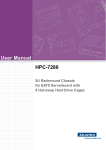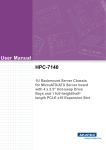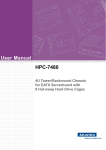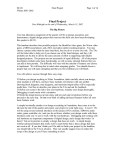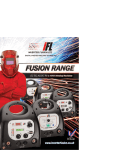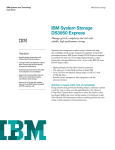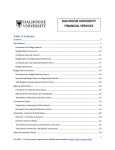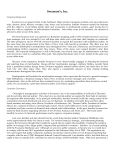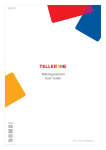Download Cash Handling Handbook - Western New Mexico University
Transcript
Draft Copy 2/2009 Cash Handling Handbook Introduction The purpose of this handbook is to establish and document the flow of cash and cash receipts, and provide guidelines for the proper management of monies for those employees responsible for receiving, handling, and safeguarding cash and cash equivalents. The fund custodian of every cash fund is responsible for the integrity of the cash fund. Employees should understand their accountability for all monies which are the property of the State. These policies and guidelines are for the protection not only of the State monies, but also those employees charged with cash handling. Definition: "Monies" - money in any form including currency (coins and bills), check, wire transfer, credit card charge, ACH (direct deposit), other electronic funds transfers, etc. Monies may also be referred to as cash or cash receipts. Table of Contents • • • • • • • • • Remote Sites Cash Policy (On & Off Campus) General Information Accepting Monies and Payments Making Deposits Accounting on the Cash Receipts Record Returned Items Approval Procedure for a Fund Custodian Definitions Additional Sources of Information Remote Sites Cash Policy (On & Off Campus) WNMU adopts as its policy the New Mexico State Statute, Section 6-10-2 NMSA 1978 Compilations that requires the deposit of public monies within twenty-four (24) hours, or one business day, of receiving the monies. In order to comply with this regulation, WNMU requires the following from its ON and OFF Campus Sites: *NO remote sites, either On or Off Campus may collect cash in any form without PRIOR approval from the Director of Fiscal Services (or designee). This requirement will enable the Business Office to assess the need for such collections and to review the Cash Policy Procedures with the entity should the remote site cash collection be warranted. *Requests for an On Campus cash box must be pre-approved by the Director of Fiscal Services or designee. If a cash box is approved for weekend or holiday use, ALL monies must be deposited back to the Business Office within 24 hours or the NEXT WORKING BUSINESS DAY. All other monies received in remote areas must also be deposited within 24 hours or next Draft Copy 2/2009 available business day to the Business Office. Cash is the responsibility of the holder at all times and must be kept in a secure, fire-proof environment (locked cash box, safe, or vault). *ALL remote site locations (both On and Off campus) must use prenumbered receipt books to record the collection of monies. A copy of the receipt should be given to the customer and a copy must be retained in the receipt book for university records. For On Campus sites, the dated Business Office receipt (received after monies are deposited) should be attached to the last appropriate receipt in the receipt book. Any cash “shortage” or “overage” will be noted on the receipt. A special account number will be provided for cash shortages and overages. This account number will be available at interim or year-end for review by the various remote site locations. The accountability for these records is the responsibility of the remote site location. Records should easily be made accessible to either internal or external auditors upon request. *All Off site remote locations will deposit monies on a daily basis to pre-established bank accounts. As needed, these monies will be transferred into the University’s regular operating account by Business Office personnel upon receipt of supporting documentation. Approved by: Policy Committee Date: February 7, 2000 General Information • It is the policy of Western New Mexico University that departments handling cash shall comply with standards established in the New Mexico State Statute 6-10-2 NMSA 1978 Compilations. • Monies include currency, coins, checks, credit card settlement reports, e-Commerce, and wire transfers. All incoming monies should be acknowledged when accepted, and forwarded to the Western New Mexico University Business Office for processing by using the WNMU Departmental Deposit form or other approved methods determined by the Business Office. For help completing the Departmental Deposit form, refer to procedures, on the WNMU Business Office website. • Monies may be payment for various charges, rebates, or refunds. • Departments holding workshops, conferences or issuing invoices that are not recorded as a part of an accounts receivable should notify the Business office so that incoming checks and transfers can be readily identified for deposit to the proper fund/orgn/account/prog. Accepting Monies And Payments Currency Payments All currency received from a walk-in customer is to be receipted immediately on sequentially pre-numbered cash receipts or through a cash register. Currency should be counted in the presence of the person presenting it for payment. A copy of the receipt should be given to a walk-in customer. No foreign currency is ever accepted. Draft Copy 2/2009 Check Payments Checks of all types received in-person or through the mail, should be restrictively endorsed immediately. Walk-in customers should receive a pre-numbered written or cash register receipt. Documents enclosed with mail payments are to be date stamped by an employee opening the mail. All checks made out to WNMU must be deposited to WNMU. For checks made out to WNMU but intended as gifts or contributions, see Monies as Gift or Donation, below. Every check or money order must be reviewed for completeness as follows: • • • • Verify that Account holder's name, address, and phone number is included on the check. A daytime phone number is preferred. Verify that the check has a bank name listed, and that the routing number, customer's bank account number, and check number are encoded on the bottom edge of the check. Note the date. Do not accept a post dated check (a check with a date in the future), or agree to hold the check for future deposit. Verify that amount written in numbers matches amount written in words. If different, make special note on the cash receipt so that the Business Office can handle appropriately. In general, banks will honor the written amount over the numerical amount. Conditions for Acceptance of Checks There are several different categories of checks. They should all be handled as checks. • • • • • • • Cashier's Check: A check purchased at a bank for any amount; the bank completes all information on the face of the check with a bank officer signing as the maker. Certified Check: A personal check that is written by the account holder and then stamped and signed by a bank officer on the front of the check. Money Order: An item purchased at a bank, post office, or other business establishment for any amount up to $1,000.00. The bank completes only the amount information. Traveler's Check: A special check supplied by banks or other companies for the use of travelers; these checks already bear the purchaser's signature and must be countersigned and dated in the cashier's presence. Personal Check: A written order payable on demand, drawn on a bank by a depositor; a personal check is written against an individual's checking account as opposed to a cashier's check, certified check, money order, or traveler's check, all of which are written against bank funds. Starter Check: A non-personalized encoded check that a person receives from a bank when they establish a checking account. These are for the person's use prior to receiving encoded checks from the bank. However, they should only be accepted if the bank has encoded the routing number and account number on the bottom of the check. Foreign Check: A check written on a foreign bank. Even if the check amount is written with "USD" following it, it cannot not be paid in U.S. currency unless it states on the front of the check that it is payable through a U.S. bank. If a foreign check is accepted, make special note on the cash receipt so that the Cashier's Office can handle appropriately. (See also Foreign Currency and Checks) Draft Copy 2/2009 Foreign Currency and Checks Only US currency (coins and bills) is accepted. Checks drawn on foreign banks or issued in foreign currencies require special processing by the WNMU Business Office, and the State Treasury. Collection on such checks can take the Treasury several days or weeks to receive the funds. The initial deposit to the department's fund will be the amount reflected on the check, even though it is in a foreign currency. The Treasury will process the item and negotiate the exchange rate. Any exchange rate differences will be charged to the depositing department, as a reduction of the deposit (debit to revenue account listed on the original cash receipt). Electronic Commerce Strict adherence to the Marketplace User’s Manual will be required for Colleges/Departments who engage in e-commerce activities including the acceptance of electronic checks, credit cards or bank debit cards through a university developed or third party vendor website. Departments desiring to establish a Cash Collection Center to engage in E-commerce activities must first complete and submit all necessary paperwork to the Business Office. If approved, departments are responsible for complying with the procedures outlined within this Handbook and the Marketplace User’s Manual. Making Deposits Safeguarding Monies Departments receiving any monies are responsible for safekeeping and timely deposit. Departments should do the following: • • • • • • Endorse checks with a restrictive endorsement immediately. Deposit all monies with the Business Office within one business day. Deposits should be made more frequently if the department lacks secure safekeeping for holding funds. All monies held overnight should be in a secure area. A reasonable, longer period for the deposit of specific monies or categories of monies is permitted if a department or unit documents a valid business reason for using a longer period between receipt of monies and deposit of monies. A reasonable, longer period must be no longer than necessary to satisfy the business reason. Examples of valid business reasons for not meeting the next-business-day deposit requirement include, but are not limited to, the following: o Peak, infrequent volume of receipts is so great that existing staff cannot meet the next-business-day requirement. o A department's staffing is severely limited, with only one or two staff members. o Under no circumstance should deposits be held for longer than one week. If a department finds isolated events where it is unable to comply with the next businessday deposit requirement due to unusual circumstances beyond its control, it is encouraged that the department document the reasons for the occurrence and retain the documentation in department files, as this may prove beneficial to the department in the event of an audit. Draft Copy 2/2009 Cash with Deposits Guidelines for sending currency and coin to Cashier's Office for deposit: • • • • Bills should be "faced" (all facing front and right-side up). This allows for more accurate recounts. Bills should be sorted by denomination, and if the number of a denomination is enough, clipped or banded into the following bundle amounts: o Ones = 25 or $25 o Fives = 20 or $100 o Tens = 20 or $200 o Twenties = 25 or $500 o Fifties = 20 or $1,000 o Hundreds = 10 or $1,000 Coin can be accepted rolled if in "shot gun" type rollers that ensure the exact count of the coin. Hand pinched rolls have to be recounted by the Business Office. Please bundle tightly, or envelope, any bills and paperwork if sent in the same bag as coin. If sending multiple bags as one deposit, the Departmental Deposit must list the bags separately and the dollar amount included in each bag. Deposit of Credit Card Batches Credit card payments are completed when a batch settlement is transmitted. All credit card payments must be settled and submitted for deposit on a daily basis. A Settlement Report must accompany a completed Cash Receipts Record. The Settlement Report (goes by various names depending on the credit card reader or machine used for processing), is a summary of transactions for a specific date or date range, and lists the total number of transactions and the total dollar amount. Most Settlement Reports will subtotal by types of credit cards used, and by charges versus credits/refunds. Deposits Made Directly to a Bank Branch Before you begin the desktop deposit, please verify that your check deposit total matches your check total on the front page of your Daily Cash Reconciliation Report. Also verify that all cashier sessions involved with the deposit have been closed. Sign onto: https://wellsoffice.wellsfargo.com/portal/signon/index.jsp; Sign-in using company ID which is: wnmuniv followed by your user name and password. Your password will change every 60 days. Draft Copy 2/2009 Once signed in, click Desktop Deposit, then Create a Deposit. Location corresponds with the campus 1 – Deming 2 – Gallup 3 – Silver City 4 – T or C Control Total is the total amount to be deposited. Deposit Name is the transaction’s date of the cashier session. (ex. 022509) Then click Scan Checks. After the screen at left pops up, organize checks to be deposited from smallest to largest, insert checks facing toward the right side of the scanner and then Scan Draft Copy 2/2009 items. To expedite the deposit, when receiving a check, write the student’s ID # or Misc. on the top of each check, depending on the transaction. Review Now When reviewing checks, always review both the front and back of each check. Verify that the check amount is correct. Completely fill in information. o If a check is for a student account, enter the student ID (W00.number) on the line for student number or MISC or Detail Code (ex. 590A). o It is not necessary to fill in the other lines once the information described above has been inputted. Draft Copy 2/2009 After each check has been reviewed, click Next item once. Errors that may occur during the deposit process When a check amount cannot be read, the screen will require check amount to be entered before you can continue. Once is it entered, proceed filling in information as described above. When Scanner cannot read MICR – re-scan message comes up, re-scan until desktop deposit page returns. You may need to re-scan several times; make sure checks are placed in the machine correctly. If MICR can’t be read, log out of Wells Fargo, contact Silver City (Jody, Josh or Cynthia) and fax copy of the check to (575) 538-6188 as it will need to be entered manually. After correction is made with the MICR, then log back in and click on Pending Deposits (image at left). Make sure to select by clicking on radio button. Draft Copy 2/2009 If needed, you can edit a balanced deposit prior to submitting it. To review a deposit, check the box next to the deposit and click View Deposit. If all items have been reviewed and the deposit is in balance, the status is balanced and the deposit is ready to be submitted. Click Save. The following screen should be displayed. Click on Deposit Later. Draft Copy 2/2009 Click on Create Reports. Choose Reviewed from the drop-down on Deposit Status. Click on the radio button for Deposit Report with Item Details. Click on Create Report. The review page will open and then click Print at the bottom of the page. Another cashier will need to review each check for deposit amount, check number and account number. Then choose Complete Deposit on the Submit Deposit–Verify page to finish submitting the deposit. Draft Copy 2/2009 Once the deposit has been submitted, Print the page with the final figures. Staple the check total tapes (normally attached to the checks) to this deposit sheet and attach the sheet to the daily cash report. Draft Copy 2/2009 Accounting On the Departmental Deposit or Cash Box Forms The Departmental Deposit form is used for departments that deposit funds on a regular/seasonal basis (for example: conference or workshop registrations, non-credit classes, childcare payments, etc.). The Cash Box form is used for events where a Business Office cash box is utilized. These cash boxes must be requested with at least 24-hour notice. Typically, this form is used for athletic events, club activities, fundraising, etc. Each cash box is assigned a box number and money is verified and signed off by the person picking up the funds. When funds are returned the cashier will verify the amount, return the cash box funds and then deposit any excess into the appropriate detail code or FOAPAL string. The detail code or accounting string will be input into the box as shown below on the form. ACCOUNT SUMMARY: Detail Code and/or FOAPAL String Amount Draft Copy 2/2009 Western New Mexico University – Procedure for Departmental Deposit 1. 2. 3. 4. 5. 6. 7. 8. 9. 10. 11. 12. 13. 14. Enter the name of the department making the deposit. Enter each check number (list each check individually). Enter the name of the person or company who is paying. Enter the amount paid. Enter the quantity of each coin in the corresponding space by denomination. Signature of the deposit preparer. Signature of the deposit verifier. Enter the phone number or extension of the individual to contact in case of questions regarding the deposit. Enter the detail code or accounting string (fund – org – account – program). If the deposit should be split between multiple accounts, please enter the amount on multiple lines. Enter the beginning customer receipt number. Enter the ending customer receipt number. Enter comments associated with the deposit – as needed. Be sure to attach all supporting documentation. For e-Commerce deposits attach required reports as determined by the Marketplace Administrator. Items Cashier Name, Date Posted, and Receipt # fields are reserved for WNMU Business Office staff. Draft Copy 2/2009 Western New Mexico University~ Procedure for Cash Box Deposits 1. Enter the name of the department making the deposit followed by the event description. 2. Enter the event date(s). 3. Enter the check number. 4. Enter the name of person or company paying. 5. Enter the amount paid. 6. Enter the Beg coin count for each denomination. 7. Enter the End coin count for each denomination. 8. Signature of the deposit preparer. 9. Signature of the deposit verifier. 10. Enter the phone number or extension of the individual to contact in case of questions regarding the deposit. 11. Enter the detail code or accounting string (fund - org - account - program). 12. Enter the amount. If there are multiple accounts for the deposit please include each on a separate line. If selling pre-numbered tickets enter the following: (1) the ticket price (2) Beginning # - Ending # (3) # of items sold 13. Enter deposit comments as needed. 14. Be sure to attach all supporting documentation. For e-Commerce deposits attach required reports as determined by the Marketplace Administrator. The Cashier Name, Date Posted and Receipt # fields are reserved for WNMU Business Office Staff ONLY. Draft Copy 2/2009 Monies as Income Monies may be deposited to: • • • An operating fund by using a fund/orgn/account/prog string. o The account code should be selected from the 5xxxx series A general ledger fund/account string. o The general ledger account code should be selected from the 1xxxx series. A pre-designated detail code. Monies as Gifts or Donations A gift is defined as a donation other than an endowment with no legal consideration imposed by the donor, i.e., nothing is expected by the donor in return for the gift. This money should not be commingled with general funds or self-support funds. These funds are spent in accordance with university regulations and must not be overdrawn. Check with the Business Office on proper allocation of gifts or donations. Typically gifts and/or donations must be handled through the WNMU Foundation. Monies as a Reduction of Expense Cash receipts which may be deposited as a reduction to expense are very limited. Vendor refunds may be the result of overpayment, returned prepayment, returned defective merchandise, credit for early payment, etc. Deposits which result in credits to account codes beginning with 6xxxx or 7xxxx should: • • • • Be credited to the fund and account code to which the original purchase was charged. Show the invoice number and/or check number of the original payment or Accounts Payable approval for refund, rebate or overpayment. Include in the description the reason (refund, overpayment). Refunds of workshop/conference registrations: o Should be recorded using a 7xxxx account code. o Include a copy of the original payment documentation as noted above. Returned Items Non-sufficient funds (NSF) checks are checks that are returned from the bank to Business Affairs, due to lack of funds in the individual account to cover the item. Business Affairs will route the check back to the bank a second time to attempt to recover the amount as written. If the check is returned to Business Affairs a second time, to record the lack of funds available for the department deposit, a JV will be processed to reverse the payment (debit to department revenue account). The depositing department will be notified and can pursue re-collection of the funds as they see fit. Draft Copy 2/2009 Approval Procedure for a Fund Custodian To be approved as a fund custodian, you must fill out the Cash Handling Appointment Form and submit it to the Vice President of Business Affairs for approval. Once approval has been given, the fund custodian must be informed of the policies and procedures through training by the Director of Fiscal Affairs (or designee). Once this training is complete, the Acknowledgement of Cash Policies and Procedures Form must be completed and submitted to the Business Affairs office. Definitions Advices Notification regarding wire transfers, ACH transfers, and bank corrections. Automated Clearing House (ACH) An ACH transfer is an electronic item that is processed through the Automatic Clearing House established as a clearing and settlement facility for financial institutions. ACH transfers take 2 to 4 business days to reach their destination and can be recalled or returned for a variety of reasons. Cash Currency, coins, and bills. It is also used for all cash equivalents such as checks. Often used in the plural: cash receipts or monies. Cash receipts (used throughout this handbook) Money in any form: currency (coins and bills), check, wire transfer, credit card charge, ACH (direct deposit), other electronic funds transfers, etc. Electronic Commerce Commonly known as ecommerce, is a type of industry where buying and selling of product or service is conducted over electronic systems such as the Internet and other computer networks. Electronic commerce draws on technologies such as mobile commerce, electronic funds transfer, supply chain management, Internet marketing, online transaction processing, electronic data interchange (EDI), inventory management systems, and automated data collection systems. Modern electronic commerce typically uses the World Wide Web at least at one point in the transaction's life-cycle, although it may encompass a wider range of technologies such as e-mail, mobile devices social media, and telephones as well. Electronic funds transfer (EFT) Generic term for any movement of funds by non-paper means; can be an Automated Clearing House (ACH) or a wire transfer. All incoming EFT payments for WNMU are processed through the University Operating Bank Account. Endorse/endorsement The act of writing or stamping, usually upon the back, but sometimes on the face, of a check or other negotiable instrument, by which the funds or property therein are assigned and transferred. Draft Copy 2/2009 Monies (used throughout this handbook) Money in any form: currency (coins and bills), check, wire transfer, credit card charge, ACH (direct deposit), other electronic funds transfers, etc. Receipt A written acknowledgment, that a sum of money or specified article has been received; the paper that provides the audit trail of the monies. Wire transfer Funds sent through the Federal Reserve Wire Network from one financial institution to another. They can only be recalled with the permission of the recipient. Wire transfers typically are used when large amounts are needed along with the ability to confirm receipt, and when international payments are made. Draft Copy 2/2009 Western New Mexico University Cash Handling Appointment Form The following named individual has been appointed as fund custodian for the petty cash/change fund for the listed department: Name Department Petty Cash or Change Fund established amount Department Head or Administrator Date PLEASE FORWARD this completed form and the Acknowledgement Form to Business Affairs. All fund custodians are required to read Western New Mexico University policies and procedures concerning cash handling and sign a statement acknowledging the duties and responsibilities of a fund custodian. Business Affairs will enroll the above named individual into training to complete this requirement. The training must be completed within 14 days of enrollment notice. Approved_______________________________________ Date:______________________ Vice President, Business Affairs Draft Copy 2/2009 Western New Mexico University Acknowledgement of Cash Policies and Procedures I do hereby certify that I, _____________________________________________________ have (Please print or type name) been authorized to serve as fund custodian for ______________________________ department. Check One: Petty Cash Account Electronic Commerce (e-Commerce) Change Fund Cash Receipts Other (specify) I acknowledge receipt of the policies and procedures prescribing management of cash. These policies and procedures have been explained to me in detail. I agree to accept responsibility for the accounting and control of the cash in accordance with such policies and procedures. I further understand that failure to comply with these policies and procedures or comparable component policies and procedures could result in disciplinary action up to and including termination and possible criminal sanctions. Fund Custodian Signature and Title Date Departmental Head Signature and Title Date



















